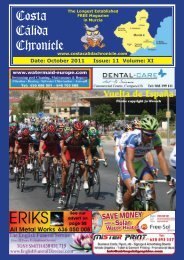Costa Cálida Chronicle - Costa Calida Chronicle
Costa Cálida Chronicle - Costa Calida Chronicle
Costa Cálida Chronicle - Costa Calida Chronicle
Create successful ePaper yourself
Turn your PDF publications into a flip-book with our unique Google optimized e-Paper software.
Cats and their Problems when Urinating<br />
We have recently had the scare over the cat<br />
and dog food supplied by one of the biggest<br />
supermarkets in the area allegedly causing<br />
the deaths of a number of pets. The problem<br />
is usually caused by animals not drinking<br />
sufficient water after eating dried animal<br />
food, although in this recent incident, it was<br />
the wet food that caused the problems.<br />
The problems experienced when cats urinating<br />
are one of the most common diseases<br />
affecting male cats. The first thing to<br />
consider is whether the animal has a real<br />
problem when urinating, or is he urinating<br />
in another place for any other reason. The<br />
former fact could be due to some infection<br />
or an accumulation of crystals in the lower<br />
urinary conducts, while the latter one would<br />
be a disorder in the behaviour of the cat.<br />
Making a difference is not usually an easy<br />
task, because sometimes the symptoms<br />
overlap. For instance, when a cat has pain<br />
when urinating due to an infection in the<br />
lower urinary conducts, it will often search<br />
for another place to pee, instead of doing<br />
in its box.<br />
Once the symptoms have been identified,<br />
vets can carry out some tests like urine<br />
tests (biochemical, sediments and culture),<br />
x-rays and scans of the abdomen in order<br />
to rule out other diseases such as infections,<br />
gallstones or tumours. A very common<br />
problem in male cats, especially the<br />
castrated ones, living a sedentary life and<br />
fed with commercial food, is the appearance<br />
of gallstones that obstruct the cat’s urethra.<br />
This can cause extreme pain and can mean<br />
spending time in the vet hospital. This is a<br />
very common disorder that be treated with<br />
some special food that prevents the formation<br />
of these gallstones and make it possible<br />
to destroy those that have been already<br />
formed. It is important to know that the cat<br />
will have to be kept on this special food forever<br />
if we do not want relapses.<br />
If these obstructions are repeated in spite<br />
of the medical and diet treatment, there<br />
is the possibility of surgery, although the<br />
techniques are usually aggressive and not<br />
always well accepted by the owners.<br />
If the cause of the problem has an infectious<br />
origin (common in female cats mainly),<br />
the cat would be treated with antibiotics<br />
for 18-20 days. If there are other reasons<br />
like neurological disorders or tumours, then<br />
surgery, medicines and chemotherapy will<br />
be required.<br />
Finally, a high percentage of these cases are<br />
due to an alteration in the cat’s behaviour<br />
when urinating. We have reached this conclusion<br />
after making all kind of tests, some<br />
of them quite complex, such as endovenous<br />
x-rays with renal contrast or x-rays of the<br />
bladder and the urethra. When a cat suffers<br />
from an alteration of the behaviour when<br />
urinating, there is a great range of disorders<br />
that it could be, but we will talk about<br />
them in another article. We usually recommend<br />
castration if it is a clear problem of<br />
sexual marking, or anti-depressive medicines,<br />
or other drugs if it is a stress problem<br />
or other diseases. On the other hand we<br />
can combine these medicines with different<br />
treatments that will help to reinforce positive<br />
behaviour, and it is advisable to take<br />
the precaution of placing different cat litter<br />
trays around the house.<br />
Article written and supplied by Paco,<br />
Clinica Veterinaria Puerto de Mazarrón<br />
Please tell our customers where you saw their advertisement in the <strong>Costa</strong> Cálida <strong>Chronicle</strong><br />
To place an advertisement with us please see page 5 or contact Teresa 619 199 407<br />
www.costacalidachronicle.com email: costacalidachronicle@gmail.com<br />
Page 69<br />
In association with <strong>Costa</strong> Cálida International Radio and www.angloINFO.com
















